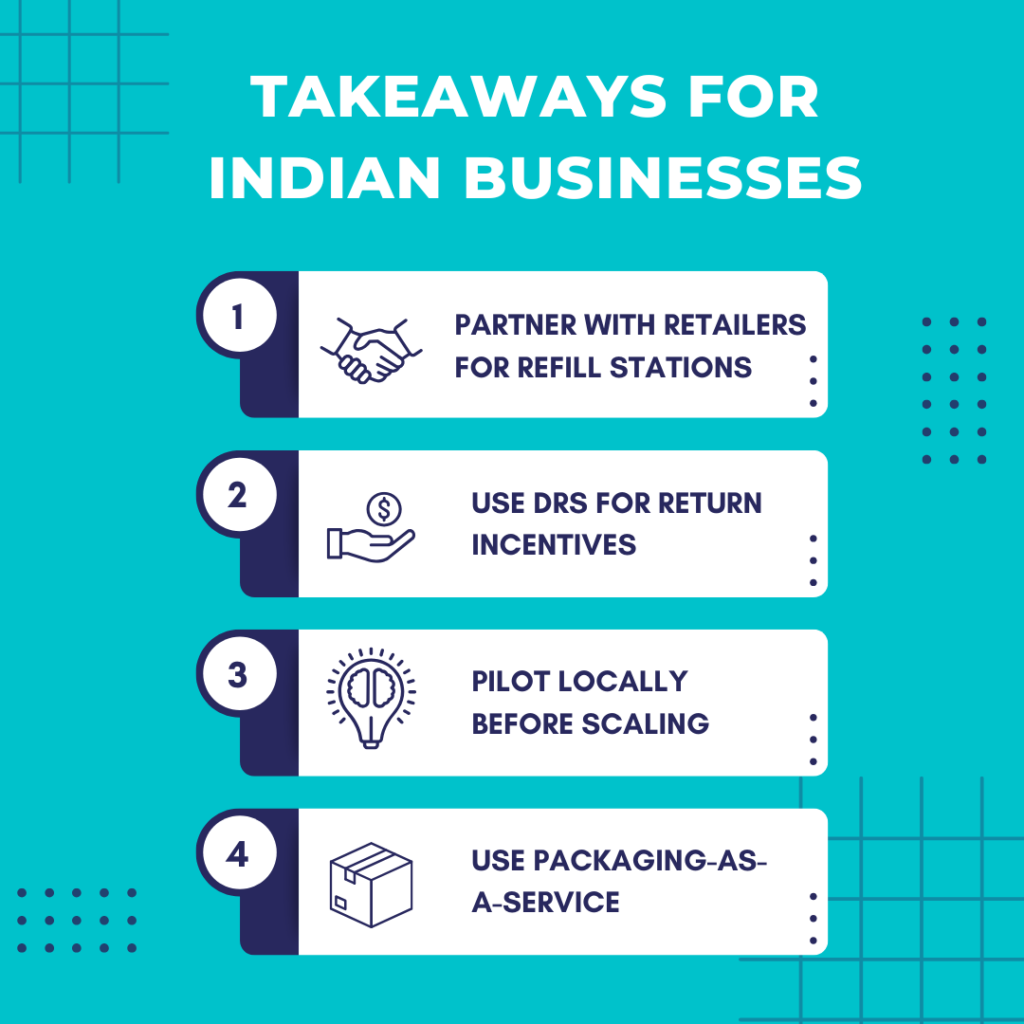Did you know that by 2030, reusable packaging could save businesses billions while significantly reducing waste? Leading brands across industries are implementing scalable reuse models to reduce waste, align with policies, and strengthen customer loyalty. Here are some benchmarks to inspire your transition to reuse:
1. Unilever: Refill on the Go for Personal Car
Unilever has launched refill stations in retail stores worldwide for its Dove, Persil, and Love Beauty and Planet brands. These stations allow consumers to refill shampoo, detergent, and body wash bottles, reducing reliance on single-use plastics. Since 2018, Unilever has launched over 50 pilots, including initiatives in Indonesia and Bangladesh.
Impact: Increases customer engagement while cutting packaging costs.
2. Coca-Cola: Return on the Go with Refillable Bottles
Coca-Cola has made significant investments in refillable glass bottle systems, particularly in Latin America and Europe. Consumers return bottles to collection points or stores, where they are cleaned and reused multiple times. Coca-Cola has committed to increasing the share of returnable or refillable products to 25% by 2030.
Impact: Reduced costs and waste, with some bottles reused up to 20 times.
3. Bisleri: Return from Home with Refillable 20-Litre Water Jars
Bisleri’s 20-litre water jar system serves businesses and households across India. Fresh jars are delivered while empty ones are collected, cleaned, and reused, creating a seamless and sustainable loop. This model has been widely adopted by water supply agencies in India, making it a benchmark for reuse in the region.
Impact: Reduces single-use plastic consumption and ensures efficient reuse through a well-managed collection and cleaning system.
4. Loop by TerraCycle: Return from Home for Durable Packaging
Loop partners with brands like Nestlé, P&G, and Unilever to deliver products in reusable containers. Customers can return empty containers from their homes for cleaning and reuse, integrated with e-commerce logistics.
Impact: Eliminates the need for single-use packaging while improving brand loyalty.
What are the takeaways for Indian Businesses?

- Collaborate with Retailers: As Unilever demonstrates, refill stations can increase footfall and reduce packaging costs.
- Leverage Deposit Systems: Like Coca-Cola, Indian beverage brands can implement deposit-return systems to drive collection and reuse.
- Innovate for Your Industry: Tailor reuse systems to complement your industry’s operations and packaging needs.
- Integrate Reverse Logistics: Embed reusable packaging collection into delivery networks, following Loop’s model.
The Time to Act is Now!
Stay tuned for the next article in the #PRK Series: Designing for Reuse: Principles for Packaging That Lasts
Looking for inspiration to implement reuse models in your business? Connect with us at 3R Solutions for tailored strategies and solutions to meet your packaging reuse goals. Follow the #PRK Series for more actionable insights!
PS: PS: This is the third article in #PRK Series. These articles are based on the World Economic Forum, India Plastics Pact, European Reuse Alliance, and Ellen MacArthur Foundation Reports.
Links
- Unilever: Refill on the Go for Personal Care https://www.unilever.com/reuse-refill-rethink-plastic/
- Coca-Cola: Return on the Go with Refillable Bottles https://packagingeurope.com/news/the-coca-cola-company-pledges-to-achieve-25-refillable-or-returnable-portfolio-by-2030/7859.article
- 4. Bisleri: Return from Home with Refillable 20-Litre Water Jars https://www.indiaplasticspact.org/our-work Landscape Assessment: Reuse Models in India
- Loop by TerraCycle: Return from Home for Durable Packaging https://edition.cnn.com/interactive/2019/01/business/loop-reusable-packaging-mission-ahead/index.html
